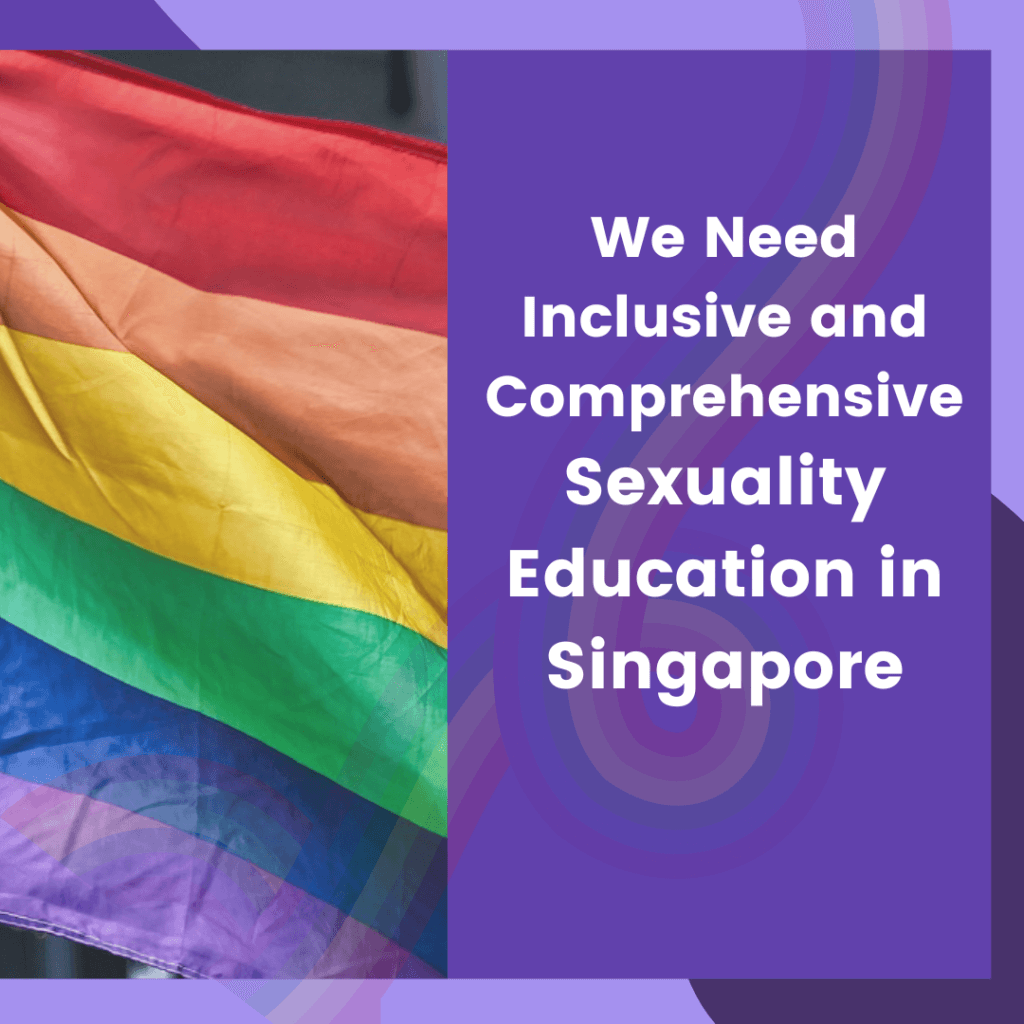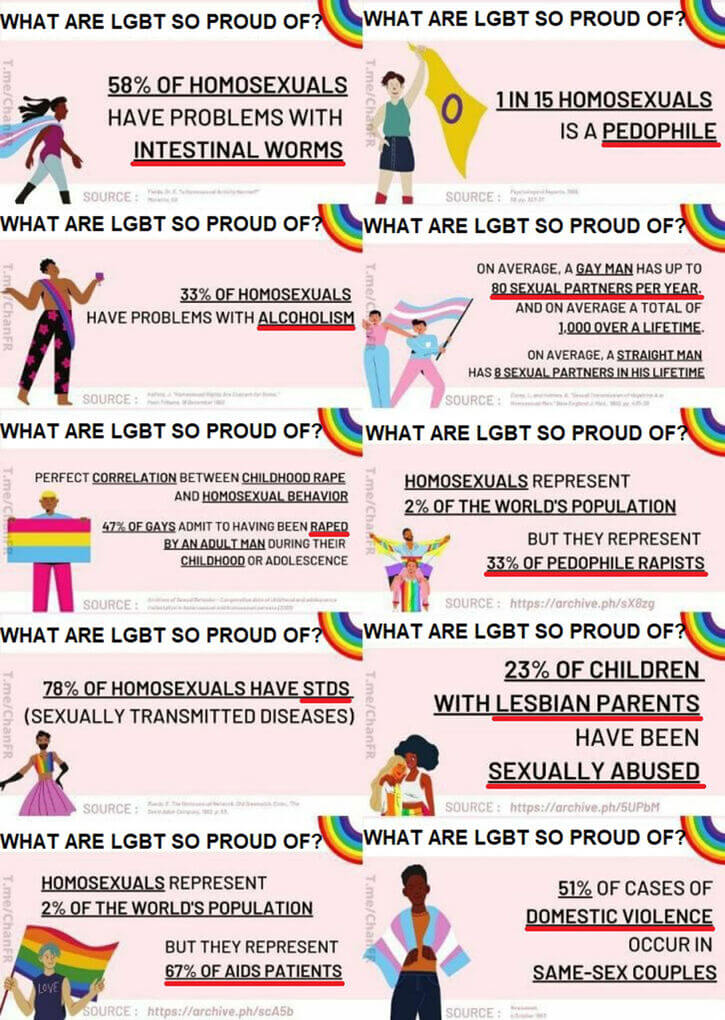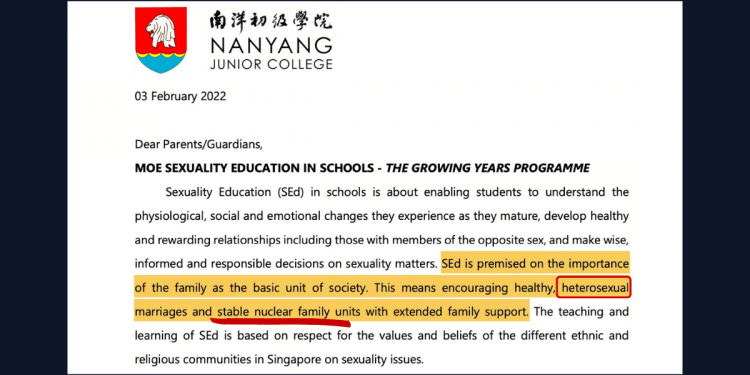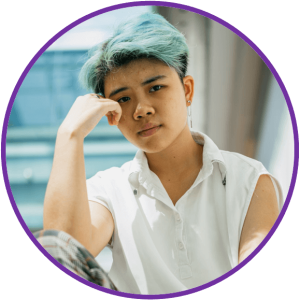 Introduction:
Introduction:
Sexuality Education (SEd) was introduced to schools in Singapore in 2000, and is “taught in the context of mainstream national values”. Following the announcement of the repeal of Section 377A, the Ministry of Education (MOE) has reaffirmed that Singapore’s “education policies and curriculum will remain anchored in Singapore’s prevailing family values and social norms, [including] marriage between a man and a woman,” and sexuality education “will remain secular, based on traditional values”.
It is clear that the MOE’s SEd curriculum is geared towards reinforcing the mainstream conversative values of cis-heteronormativity and sexual restraint. This article strives to address the inadeptness of Singapore’s SEd, and the importance of having a SEd programme that is inclusive and comprehensive.
LGBTQ+ Content (Or Rather, Lack Thereof)
“58% OF HOMOSEXUALS HAVE PROBLEMS WITH INTESTINAL WORMS”. This, alongside other absurd and prejudiced misinformation, was presented as fact to Hwa Chong Institution’s Secondary 4 students. The Hwa Chong counsellor who delivered this homophobic presentation has since been suspended, but this incident nonetheless epitomises how unsafe and unaffirming schools are for LGBTQ+ students. And while this particular counsellor’s views were “not representative of the views of the position of the school or MOE”, SEd at large in government schools tend to either erase or villianise the LGBTQ+ community. Ironically, sexuality education barely addresses the diverse sexualities and gender identities.

The Singapore LGBT encyclopaedia Wiki
(Pink Dot SG has since debunked these falsehoods in this post.)
According to the #FixSchoolsNotStudents Press Release, schools continue to “discuss LGBTQ+ identities mainly in the context of informing students during sex-ed that Section 377A deems homosexual conduct illegal and opposed to societal norms, and failing to provide LGBTQ-inclusive information on sexual and reproductive health and well-being”. Though it is not announced how the upcoming repeal of Section 377A may or may not change how Section 377A will be discussed in classrooms, SEd will nonetheless continue to centre heterosexual couplehood, especially with how schools have been consistent in asserting that SEd serves to “[encourage] healthy, heterosexual marriages and stable nuclear family units with extended family support”.


Schools are where students go to learn. Without access to resources and information about the existence of various sexual orientations beyond heterosexuality, about the existence of various gender identities beyond cisgender women and men, how does the state intend to stay true to its word on rooting itself in “justice and equality”? Where students are unable to, through educational institutions, be educated on the mere existence of LGBTQ+ identities, how are LGBTQ+ students to receive the resources and support they need to feel safe, included, and supported? And how would cisheterosexual students know how to be respectful, to be allies amidst not just a diverse population, but a population in which certain groups of people face homophobia and/or transphobia? If Singapore genuinely wants to be a state for its citizens (i.e. every citizen), our leaders cannot deprive our students of the resources and vocabulary and tools they need to look out for themselves and for one another.
We Need Comprehensive SEd
Aside from how SEd centres only cisgender and heterosexual people, sexuality education also strangely barely covers anything pertaining to sex. Conducted in schools from Primary 5 to junior colleges and Millennia Institute, MOE‘s SEd “promotes abstinence before marriage”. Unsurprisingly, 17-year-old Tasya, a secondary school student, shares, “In my school, we have not discussed sex; we have instead focused on relationship-building, romantic or not, and how to manage emotions.”. The lack of discussion on sex itself hampers discussions on how to engage in safe sexual practices in order to protect their sexual and emotional health.
Contrary to popular belief UNESCO claims that evidence has shown that SEd “does not increase sexual activity, sexual risk-taking behaviour or STI/HIV infection rates,” and it is ironically the “programmes that promote abstinence as the only option [that] have been found to be ineffective in delaying sexual initiation, reducing the frequenct of sex, or reducing the number of sexual partners”.
Resources
With inapt SEd in schools and hesitation from parents to teach SEd to their children, children are left unguided in their exploration of SEd – while the online sphere does have a wide array of resources, they are also not immune to chancing upon unethical pornography, misogynistic content, and so on. Until comprehensive SEd is introduced in schools, this makes it especially important for there to be reliable, accessible SEd resources outside the classroom, for youths to learn more about various topics.
SEd should empower individuals to make informed and responsible choices, to protect themselves and others. As we continue to advocate for inclusive and comprehensive SEd in schools, please do tap into the non-exhaustive list of various outside-of-school resources available to take charge of your sexual health and wellbeing.
Added by Dr Martha Tara Lee
USA-based support groups and resources:
Online groups for young people, family members and caregivers: https://www.genderspectrum.
LGBTQ+ resources on religion and faith: https://www.hrc.org/resources/
LGBTQ Catholics:
https://
LGBTQ & Muslim resources:
https://www.mpvusa.org/lgbtqi-
List of resources (and source of webinars and education): https://www.thegenderdoctor.
Family Acceptance Project: https://familyproject.sfsu.
Latiné LGBTQ people: https://www.hrc.org/resources/
A short animated movie about family acceptance in Spanish: https://www.somosfamiliabay.
A gender-inclusive and affirming sex education resource for teens https://www.scarleteen.com/
You may also check out resources like The Trevor Project, which provides various LGBTQ+-related articles, resources, and guides.
Books
- Barker, M. & Scheele, J. (2019). Gender: a graphic guide. Icon Books.
- Barker, M. J. & Iantaffi, A. (2019). Life Isn’t Binary: on being both, beyond, and in-between. Jessica Kingsley Publishers.
- Holleb, M.L.E. (2019). The A-Z of Gender and Sexuality. From Ace to Ze. Jessica Kingsley Publishers.
- Iantaffi, A., & Barker, M. J. (2018). How to understand your gender: A practical guide for exploring who you are. Jessica Kingsley Publishers.
- Young, E. (2019). They/Them/Their. A guide to non-binary and genderqueer identities. Jessica Kingsley Publishers.
- Tannehill, B. (2018). Everything You Ever Wanted to Know about Trans (But Were Afraid to Ask). Jessica Kingsley Publishers.
- Whittlesey, C. (2021). The Beginner’s Guide to Being A Trans Ally. Jessica Kingsley Publishers.
- You can find the entire Jessica Kingsley gender diversity list, which includes several children’s books as well at: https://intl.jkp.com/usa/
gender-diversity/gender- diversity.html - More sex ed books here and here.
 About Elijah Tay
About Elijah Tay
Elijah Tay (they/them) is a passionate youth activist who has been involved in advocacy work since they were in secondary school. At the age of 16, they founded initiatives like @QueersOfLH and @MyQueerStorySG to uplift the voices of the LGBTQ+ community in school and in Singapore respectively. They have also shared extensively in live discussions and podcasts, such as on New Naratif’s Political Agenda, Sayoni’s webinars, SPEQ:TRUM podcast, Lesbeheard’s Instagram Live and Ferne Health’s online workshop. They believe in the importance of creating safe spaces while moving society towards becoming a safe space for all.
Instagram: https://www.instagram.com/elijahtaypeng/
LinkedIn: https://www.linkedin.com/in/elijahtay
Facebook: https://www.facebook.com/myqueerstorysg

 Become a Patron!
Become a Patron!
